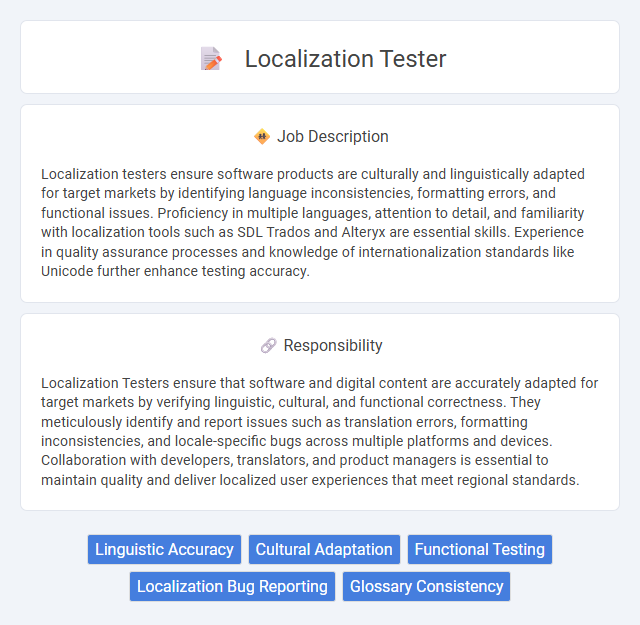
Localization testers ensure software products are culturally and linguistically adapted for target markets by identifying language inconsistencies, formatting errors, and functional issues. Proficiency in multiple languages, attention to detail, and familiarity with localization tools such as SDL Trados and Alteryx are essential skills. Experience in quality assurance processes and knowledge of internationalization standards like Unicode further enhance testing accuracy.
Individuals with strong attention to detail and a passion for languages or cultural nuances are likely to be suitable for a Localization Tester role. Those who excel at identifying inconsistencies and have patience for repetitive tasks may find this job aligns well with their skills. People who prefer dynamic or highly creative work environments might struggle to stay engaged in this position.
Qualification
Strong proficiency in multiple languages and deep understanding of cultural nuances are essential qualifications for a Localization Tester to ensure accurate and contextually relevant multinational product experiences. Expertise in software testing methodologies and familiarity with localization tools such as SDL Trados, memoQ, or Linguistic Quality Assurance (LQA) frameworks enhance the ability to identify linguistic and functional issues effectively. Experience with automation testing, bug tracking software like JIRA, and collaboration with development and localization teams further solidifies a candidate's qualification for successfully delivering localized digital products.
Responsibility
Localization Testers ensure that software and digital content are accurately adapted for target markets by verifying linguistic, cultural, and functional correctness. They meticulously identify and report issues such as translation errors, formatting inconsistencies, and locale-specific bugs across multiple platforms and devices. Collaboration with developers, translators, and product managers is essential to maintain quality and deliver localized user experiences that meet regional standards.
Benefit
Localization Tester roles probably offer significant benefits such as exposure to diverse languages and cultures, enhancing cross-cultural communication skills. This job might provide opportunities to work with global teams, increasing professional networking potential. Additionally, it is likely to improve attention to detail and problem-solving abilities, valuable in many career paths.
Challenge
Localization Tester roles likely present challenges related to ensuring software and content accuracy across multiple languages and cultural contexts. Successfully identifying linguistic errors, cultural nuances, and functional inconsistencies may require deep attention to detail and strong communication skills. Navigating varied platforms and maintaining high-quality standards under tight deadlines could also be probable difficulties in this job.
Career Advancement
Localization Tester roles offer strategic career advancement by honing expertise in software quality assurance and linguistic accuracy across global markets. Mastery in automation tools and understanding of cultural nuances boost progression to positions like Localization Engineer or QA Manager. Continuous learning in localization technologies and project management enhances opportunities for leadership and specialized roles within international development teams.
Key Terms
Linguistic Accuracy
Localization testers ensure linguistic accuracy by meticulously evaluating translated content to confirm it aligns with cultural nuances and target audience expectations. They identify and resolve inconsistencies, grammatical errors, and contextual inaccuracies within software, websites, and multimedia platforms. Their expertise guarantees that localized products maintain the original intent and deliver a seamless user experience across diverse markets.
Cultural Adaptation
Localization Testers play a crucial role in cultural adaptation by ensuring software and content are accurately tailored to the target audience's linguistic and cultural context. They identify cultural nuances, idiomatic expressions, and regional preferences, preventing potential misunderstandings or offensive content. This process ultimately enhances user experience and market acceptance in diverse regions.
Functional Testing
Localization Testers perform functional testing to ensure software applications operate correctly across different languages and regions. They verify UI elements, workflows, and features function as intended within localized environments, identifying issues related to text expansion, date formats, currency, and input methods. Their role guarantees seamless user experience and compatibility by detecting bugs that affect software usability in targeted locales.
Localization Bug Reporting
Localization testers specialize in identifying and documenting localization bugs that affect software usability and accuracy across different languages and regions. Precise localization bug reporting involves detailing language inconsistencies, cultural inaccuracies, and formatting errors with clear reproduction steps and screenshots to facilitate quick resolution. Effective communication of these discrepancies ensures product quality and user satisfaction in diverse global markets.
Glossary Consistency
A Localization Tester ensures glossary consistency by meticulously verifying that translated terms adhere to predefined glossaries, maintaining linguistic accuracy across software, websites, and applications. They identify discrepancies in terminology usage to preserve brand voice and enhance user experience in different languages. This role is critical in preventing miscommunication and ensuring cultural relevance in localized content.
 kuljobs.com
kuljobs.com